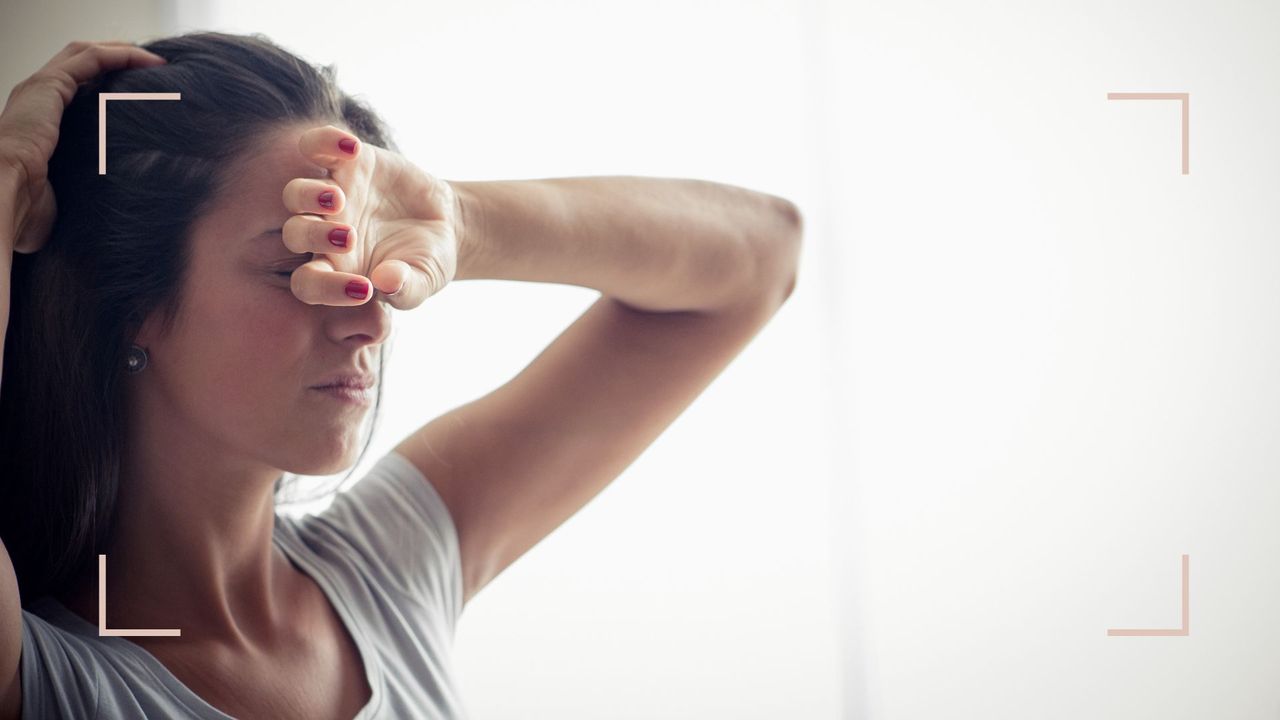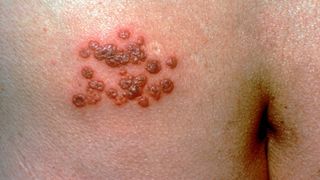What are the symptoms of shingles, and does shingles make you tired?
Wondering if you have the symptoms of shingles? Here's everything you need to know about the infection


It's worth looking out for symptoms of shingles if you feel tired, worn out, or generally lethargic, even if you've had enough sleep. After all, it's estimated that one in four of us will experience shingles once in our lives.
Known as herpes zoster, shingles is an infection of a nerve and the skin around it. It's caused by the varicella-zoster virus, which also causes chickenpox. This is good news for some, as it's not possible to have shingles if you've never been exposed to chickenpox or the virus that causes it. However, if you've never had chickenpox and become exposed to someone with shingles, you may get it.
While many people turn to supplements for sleep and sleep aids to try and learn how to sleep better, if you're feeling under the weather, consider whether it could be shingles first. Here Dr Samantha Wild, clinical lead for women's health and a GP at Bupa UK, explains what you need to know about the symptoms of shingles, how it relates to tiredness, and all the treatment options available.
What are the symptoms of shingles in adults?
The first symptom of shingles is often oversensitivity or a painful burning sensation either on the face, chest, back, abdomen or pelvis, usually on one side of the body, explains Dr Wild. You might also have a high temperature, or feel unwell for a few days before a rash appears on your skin.
But this rash isn't the same kind you'd get if you have sensitive skin, eczema, or suffer during allergies season. The rash usually starts as small, raised red spots before turning into small blisters full of cloudy fluid. "These blisters dry up after 5-7 days and form scabs that usually drop off within 2-3 weeks", she says.
If you're worried that you have shingles, you should also check for red blotches on your skin on one side of your body. "A rash on both the left and the right side is unlikely to be shingles," Dr Wild explains. "Shingles can affect both sides of the body, but it’s very rare, usually only in those with a weakened immune system. Shingles blotches can become painful and will blister. Your skin around the infected area will remain painful or uncomfortable until the rash has completely disappeared."
As with chicken pox, you should avoid scratching the rash as it can leave scars.
Sign up for the woman&home newsletter
Sign up to our free daily email for the latest royal and entertainment news, interesting opinion, expert advice on styling and beauty trends, and no-nonsense guides to the health and wellness questions you want answered.

Does shingles make you tired?
Yes, many people say they feel extremely tired during and after infection. But it's not actually shingles itself that makes people tired, Dr Wild explains, it's the cause of the infection itself.
"Shingles is a reactivation of the chickenpox virus, but normally only in one nerve root. Usually, the virus lies dormant and doesn't cause any problems but if your immune system, which normally protects your body against infection, is weakened then the virus can become active again and cause shingles," she says.
This weakening of the immune system happens due to a whole number of reasons, Marian Nicholson, director of Shingles Support Society says. "We often find that a person was unwell or overtired, or had an operation or even a bereavement, and this stress or exhaustion occurred before shingles appeared."
The tiredness and general feelings of weakness shouldn't last too long though. "They'll most likely be gone within four weeks. At most, six weeks. If you are still experiencing symptoms after this time, visit your doctor," Dr Wild adds.
To help combat this tiredness, she recommends building relaxation techniques into your daily routine. "It can really help you to relax before bed and improve your sleep."
Pay particular attention to your bedtime routine around this time and make sure you have lots of wind-down time planned. Whether that's having a bath, listening to relaxing music, practicing sleep-guided meditations or doing some gentle bedtime yoga.
How long does shingles last?
How long shingles lasts depends on the individual, but Dr Wild tells us it usually lasts around three to five weeks. "Your skin may be painful or uncomfortable after the rash has gone, however, this usually settles over time," she adds.
Is shingles contagious?
Strictly speaking, shingles itself is not contagious. You can't catch it from someone with the condition or from someone who has chickenpox, Dr Wild says. "However, if you haven't had chickenpox before, you can catch it from someone with shingles."
This is because the blisters that form contain the live virus. As a report by the Centers for Disease Control (CDC) explains, if a person who has never had chickenpox is exposed to the open blister or something that has fluid on it, they won't have the antibodies to counteract the virus and can develop chickenpox.
For this reason, "if you have a weakened immune system, it's best to avoid someone with shingles," Dr Wild explains. "If you're pregnant and haven't had chickenpox, you should avoid anyone with shingles too. These general rules are to be on the safe side though, as it's usually direct contact with the rash that passes the virus on."
Is there a treatment for shingles?
While there is no cure for shingles, there are treatments out there that can be done at home or prescribed by your doctor to speed up recovery and ease symptoms.
"If your skin is very itchy in places, you can try using cool or wet compresses to ease the itch," suggests Dr Wild. "You can also take paracetamol if you have any pain or a fever."
Dr Wild also suggests wearing smooth, cotton fabrics as they are less likely to irritate your skin. To keep your rash clean and dry as well, so you reduce the risk of infection.
When to see a doctor about shingles
If you notice any symptoms of shingles, Dr Wild suggests contacting your doctor for a phone or video appointment to discuss your symptoms further.
"You might need medicine to help speed up your recovery and avoid longer-lasting problems. In any case, your doctor will be able to help," Dr. Wild adds

Grace Walsh is woman&home's Health Channel Editor, working across the areas of fitness, nutrition, sleep, mental health, relationships, and sex. She is also a qualified fitness instructor. In 2025, she will be taking on her third marathon in Brighton, completing her first ultra marathon, and qualifying as a certified personal trainer and nutrition coach.
A digital journalist with over seven years experience as a writer and editor for UK publications, Grace has covered (almost) everything in the world of health and wellbeing with bylines in Cosmopolitan, Red, The i Paper, GoodtoKnow, and more.
-
 I asked scientists about the best exercise for longevity - and they all said the same 3 workouts
I asked scientists about the best exercise for longevity - and they all said the same 3 workoutsWondering what the best exercise for longevity is? We've asked scientists, personal trainers, and doctors for the must-do workouts to live healthier for longer
By Grace Walsh Published
-
 Meghan Markle gives sneak peak of 'understated luxury' kitchen - her Le Creuset favourites have our seal of approval
Meghan Markle gives sneak peak of 'understated luxury' kitchen - her Le Creuset favourites have our seal of approvalWith Love, Meghan gave fans an idea of what the Duchess of Sussex’s kitchen style is like and now we’ve had it confirmed in a sneak peek.
By Emma Shacklock Published